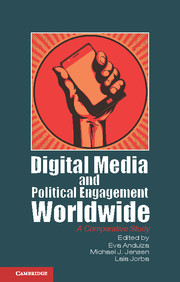Book contents
- Frontmatter
- Contents
- List of Tables and Figures
- Contributors
- Acknowledgments
- Introduction
- 1 The Impact of Digital Media on Citizenship from a Global Perspective
- 2 Recent Shifts in the Relationship between the Internet and Democratic Engagement in Britain and the United States
- 3 Political Engagement and the Internet in the 2008 U.S. Presidential Elections
- 4 Online Political Participation in the United States and Spain
- 5 Internet Use and Political Attitudes in Europe
- 6 Digital Media and Offline Political Participation in Spain
- 7 Online Participation in Italy
- 8 On the Causal Nature of the Relationship between Internet Access and Political Engagement
- 9 The Uses of Digital Media for Contentious Politics in Latin America
- 10 Opening Closed Regimes
- 11 Digital Media and Political Attitudes in China
- Conclusion
- References
- Index
8 - On the Causal Nature of the Relationship between Internet Access and Political Engagement
Evidence from German Panel Data
Published online by Cambridge University Press: 05 July 2012
- Frontmatter
- Contents
- List of Tables and Figures
- Contributors
- Acknowledgments
- Introduction
- 1 The Impact of Digital Media on Citizenship from a Global Perspective
- 2 Recent Shifts in the Relationship between the Internet and Democratic Engagement in Britain and the United States
- 3 Political Engagement and the Internet in the 2008 U.S. Presidential Elections
- 4 Online Political Participation in the United States and Spain
- 5 Internet Use and Political Attitudes in Europe
- 6 Digital Media and Offline Political Participation in Spain
- 7 Online Participation in Italy
- 8 On the Causal Nature of the Relationship between Internet Access and Political Engagement
- 9 The Uses of Digital Media for Contentious Politics in Latin America
- 10 Opening Closed Regimes
- 11 Digital Media and Political Attitudes in China
- Conclusion
- References
- Index
Summary
Introduction
Digital media are expected by many scholars to revolutionize democracy (for an overview, see Barber 1999; Ward and Vedel 2006). Although a pessimistic school of thought argues that the internet provides governments opportunities for subtle surveillance and control (Barber 1999; Krueger 2006), more optimistic analysts counter that the internet may strengthen civil societies, grassroots politics, and direct democracy (Coliagnese 2003; Hara and Estrada 2005). This second school of thought expects the internet, among other things, to increase the political involvement of citizens and their propensity to take political action (for a review, see the Introduction and Chapter 1).
The past fifteen years have seen dramatic changes in how citizens and policy makers communicate. Worldwide, the internet and online forums are playing an ever more central role in candidates and parties’ efforts to mobilize campaign participation (Norris 2003; Howard 2005), and in many countries, the internet is also replacing newspapers and television as a primary source of political information for an increasing number of groups in society, especially younger people (Norris 2002; Johnson and Kaye 2003; Tolbert and McNeal 2003; De Zúñiga, Puig-i-Abril, and Rojas 2009). Although the internet has changed the forms of political communication, many scholars doubt that it has also changed the prevalence of political engagement in the population at large. These skeptics argue that the internet is “preaching to the converted” (Norris 2003, 21); that is, politically mobilized citizens select themselves into using the internet, but access to the internet does not causally increase political engagement.
- Type
- Chapter
- Information
- Digital Media and Political Engagement WorldwideA Comparative Study, pp. 160 - 176Publisher: Cambridge University PressPrint publication year: 2012
- 6
- Cited by

